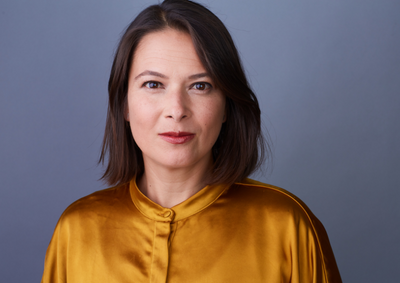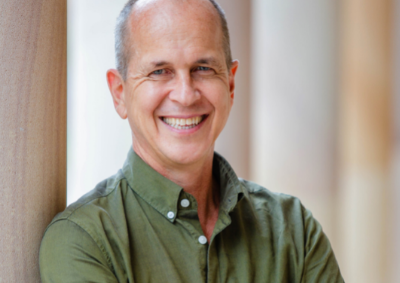Elaine Pearson: Chasing Wrongs and Rights
Elaine Pearson
In-Conversation with Professor Peter Greste
Elaine Pearson, the Director of Human Rights Watch Australia shares her experiences defending human rights – from human trafficking in Nepal to the 'drug war' in the Philippines to treatment of detainees in Papua New Guinea and in Australia – offering an extremely personal account of how far we have come, and how far we have to go.
Growing up in Perth, Elaine Pearson always dreamt of the wider world. Her British father and Singaporean-Chinese mother meant that her family extended beyond our shores, but it wasn’t until later in life that she fully understood how her professional calling might have been influenced by personal history: she learned that her beloved maternal grandmother had been sold to an opera troupe as a child to save the family from starvation.
As soon as she could, Elaine followed her interest in women’s rights and people-trafficking, interviewing sex-workers and victims of trafficking on the streets of Bangkok and Amsterdam’s red light district. Her experiences in Nepal and Nigeria profoundly shaped her understanding of how governments and NGOs need to protect the rights of victims, as well as how poverty, corruption and war drive trafficking in the first place.
Elaine’s story takes us on a panoramic survey of human rights across the world – into the UN committee rooms of New York and Geneva, as well as to the front-lines of Sri Lanka’s search for those who disappeared in the country’s civil war, examining death squad killings on the Philippines island of Mindanao and the detention of asylum seekers in Papua New Guinea. And her work on the appalling treatment of prisoners, many of whom are Aboriginal, vividly demonstrates that human rights abuses are something that happens at home as well as out in that wider world.
In exploring human rights abuses and governments’ failure to address them, Elaine Pearson's book, Chasing Wrongs and Rights sometimes shows humanity at its worst. Just as often, though, we see people at their best – compassionate, resilient, determined. Deeply informative and inspiring, Elaine Pearson’s story will leave you understanding how much needs to change, and how individuals can make a difference.
Elaine Pearson will be in-conversation with award-winning journalist Professor Peter Greste.
Praise for Chasing Wrongs and Rights
Elaine Pearson has a long history of struggling for people oppressed around the world while working in several human rights organisations, most notably Human Rights Watch. Chasing Wrongs and Rights gives us an opportunity to explore intersecting systems of oppression that operate in various parts of the world. With a wealth of experience, the writer opens our eyes to the intimate effects of such systems as she interweaves her own personal narrative through the text. Challenging and revealing, this book is an important offering to young activists to come.’
Associate Professor Behrouz Boochani, Journalist, Human Rights Defender, Writer and Film Producer
Click HERE to pre-order a copy of Elaine's book, Chasing Wrongs and Rights: My Experience Defending Human Rights Around the World, from Matilda Bookshop's website and choose Hawke Centre Events Free S.A. Postage as the delivery option. When published in September they will deliver or post (FREE OF CHARGE) your book to South Australian addresses or it can be collected at the event.
Presented by The Bob Hawke Prime Ministerial Centre
ELAINE PEARSON
DIRECTOR, HUMAN RIGHTS WATCH AUSTRALIA
ADJUNCT LECTURER IN LAW, UNIVERSITY OF NEW SOUTH WALES

Elaine Pearson is the Director of Human Rights Watch Australia, based in Sydney. She established Human Rights Watch’s Australia office in 2013 and works to influence Australian foreign and domestic policies in order to give them a human rights dimension. Pearson writes frequently for a range of publications and her articles have appeared in the Guardian, the Sydney Morning Herald, The Australian, Foreign Policy and the Washington Post. From 2007 to 2012 she was the Deputy Director of Human Rights Watch's Asia Division based in New York. She has conducted numerous human rights investigations in Australia and around the world.
Prior to joining Human Rights Watch, Pearson worked for the United Nations and various non-governmental organisations in Bangkok, Hong Kong, Kathmandu and London. She is an Adjunct Lecturer in law at the University of New South Wales, on the advisory committee of UNSW’s Australian Human Rights Institute and on the board of the Global Alliance Against Traffic in Women. Pearson holds degrees in law and arts from Murdoch University and obtained her Master's degree in public policy at Princeton University's School of Public and International Affairs.
Twitter: @PearsonElaine
PROFESSOR PETER GRESTE
FILM MAKER, JOURNALIST, AUTHOR AND
PROFESSOR OF JOURNALISM, MACQUARIE UNIVERSITY

Professor Peter Greste is an academic, film maker, journalist, and author. He is currently professor of journalism at Macquarie University. He came to academia in 2018 after a 30-year career as an award-winning foreign correspondent for the BBC, Reuters, CNN and Al Jazeera, in some of the world’s most volatile places. From Afghanistan, to Latin American, Africa and the Middle East, he has reported from the frontlines and beyond.
In 2011, he won a Peabody Award for a documentary on Somalia, Land of Anarchy, for the BBC’s flagship current affairs program, Panorama. He is best known for becoming a headline himself, when he and two of his colleagues were arrested in Cairo while working for Al Jazeera, and charged with terrorism offences. In letters smuggled from prison, he described the arrests as an attack on media freedom. The letters helped launch a global campaign that eventually got them released after more than 400 days in prison. His struggle helped earn him numerous awards including from the British Royal Television Society, the Walkley Foundation, the RSL, the Australian Human Rights Commission and the International Association of Press Clubs.
In 2017, with two colleagues, he established the advocacy group, the Alliance for Journalists’ Freedom which actively campaigns for media freedom across Australia and the Asia Pacific region. As an academic, he leads a research program investigating the impact of national security legislation on public interest journalism. Peter is the author of The First Casualty about his experiences in Egypt, and the wider war on journalism.
Twitter: @PeterGreste
PRESENTED BY
THE BOB HAWKE PRIME MINISTERIAL CENTRE
![]()
While the views presented by speakers within The Bob Hawke Prime Ministerial Centre public program are their own and are not necessarily those of either the University of South Australia, or The Bob Hawke Prime Ministerial Centre, they are presented in the interest of open debate and discussion in the community and reflect our themes of: Strengthening our Democracy - Valuing our Diversity - Building our Future.
The copying and reproduction of any transcripts within The Bob Hawke Prime Ministerial Centre public program is strictly forbidden without prior arrangements.
While the views presented by speakers within The Bob Hawke Prime Ministerial Centre public program are their own and are not necessarily those of either the University of South Australia, or The Bob Hawke Prime Ministerial Centre, they are presented in the interest of open debate and discussion in the community and reflect our themes of: Strengthening our Democracy - Valuing our Diversity - Building our Future. The Hawke Centre reserves the right to change their program at any time without notice.